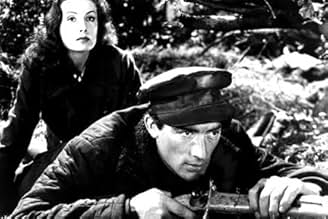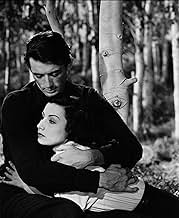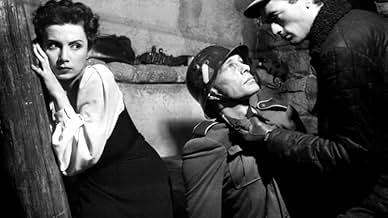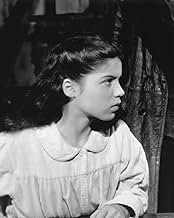IMDb रेटिंग
6.1/10
1.5 हज़ार
आपकी रेटिंग
अपनी भाषा में प्लॉट जोड़ेंA heroic guerrilla group fights back against impossible odds during the 1941 German invasion of the Soviet Union.A heroic guerrilla group fights back against impossible odds during the 1941 German invasion of the Soviet Union.A heroic guerrilla group fights back against impossible odds during the 1941 German invasion of the Soviet Union.
- निर्देशक
- लेखक
- स्टार
- 1 ऑस्कर के लिए नामांकित
- 3 जीत और कुल 1 नामांकन
Tamara Toumanova
- Nina
- (as Toumanova)
Glen Vernon
- Mitya
- (as Glenn Vernon)
Edward L. Durst
- Petrov
- (as Edward Durst)
Maria Bibikov
- Vera
- (बिना क्रेडिट के)
William Challee
- Ducrenko
- (बिना क्रेडिट के)
Gretl Dupont
- Mariya
- (बिना क्रेडिट के)
Charles H. Faber
- German Corporal
- (बिना क्रेडिट के)
Erford Gage
- Col. Prilenko
- (बिना क्रेडिट के)
Peter Helmers
- Von Rundhol
- (बिना क्रेडिट के)
Adolf E. Licho
- Anton
- (बिना क्रेडिट के)
फ़ीचर्ड समीक्षाएं
Pray silence, workers and peasants, for a "cast of new personalities" headed by the debut of "Mr Gregory Peck, distinguished actor on the New York stage".
A suitably solemn intro for the late Mr P, who supplies a characteristically cigar-store-Indianesque turn as the darkly handsome Russian dam-builder turned train-buster, heading a WW2 band of partisans (i.e., terrorists). His stern Soviet soul is melted only by a sultry ballerina who is stranded with the gang. Other members include a comic peasant double act, a learned Oxonian sidekick and a winsome teen brother and sister, one of whom ends on a Nazi noose (the wrong one, given the girl's saccharine performance).
This retrospectively hilarious and morally objectionable whitewashing of the most murderous tyranny in history- the communist USSR- fudges its politics like all the Hollywood "enemy of my enemy is my friend" wartime propaganda pieces. "Socialism" as the Peck character's creed is never mentioned. Inspiration for the partisans' efforts is made out to be no more than a worthy resentment of trespassers on their home ground, whether it's a dictatorship or not. (By the same logic Hollywood should now be shooting films justifying Iraqi guerilla resistance to the Americo-British occupation, but don't hold your breath.) The unpalatable truth that many in the western Soviet Union welcomed and collaborated with the Germans has to be evaded. In this flick, solidarity is absolute.
Apart from this hollowness at the core, the film is a decent string of shoot-em-ups in a convincingly icy studio landscape. The stage actors in the cast were and remained unfamiliar, making the thing seem a mite more authentic than, say, "For Whom the Bell Tolls". But Ms Toumanova, the producer's girlfriend at the time, conceives emotional acting as gazing into the remote distance with her lips slightly parted: the influence of Garbo was disastrous! And it would take Selznick and King Vidor to extract a full-blooded performance from Peck, in "Duel in the Sun". It's curious, incidentally, that Casey Robinson, writer and producer of this paean to Stalin, never got serious heat from the House Un-American Activities Committee after the war. Did he cut a deal?
A suitably solemn intro for the late Mr P, who supplies a characteristically cigar-store-Indianesque turn as the darkly handsome Russian dam-builder turned train-buster, heading a WW2 band of partisans (i.e., terrorists). His stern Soviet soul is melted only by a sultry ballerina who is stranded with the gang. Other members include a comic peasant double act, a learned Oxonian sidekick and a winsome teen brother and sister, one of whom ends on a Nazi noose (the wrong one, given the girl's saccharine performance).
This retrospectively hilarious and morally objectionable whitewashing of the most murderous tyranny in history- the communist USSR- fudges its politics like all the Hollywood "enemy of my enemy is my friend" wartime propaganda pieces. "Socialism" as the Peck character's creed is never mentioned. Inspiration for the partisans' efforts is made out to be no more than a worthy resentment of trespassers on their home ground, whether it's a dictatorship or not. (By the same logic Hollywood should now be shooting films justifying Iraqi guerilla resistance to the Americo-British occupation, but don't hold your breath.) The unpalatable truth that many in the western Soviet Union welcomed and collaborated with the Germans has to be evaded. In this flick, solidarity is absolute.
Apart from this hollowness at the core, the film is a decent string of shoot-em-ups in a convincingly icy studio landscape. The stage actors in the cast were and remained unfamiliar, making the thing seem a mite more authentic than, say, "For Whom the Bell Tolls". But Ms Toumanova, the producer's girlfriend at the time, conceives emotional acting as gazing into the remote distance with her lips slightly parted: the influence of Garbo was disastrous! And it would take Selznick and King Vidor to extract a full-blooded performance from Peck, in "Duel in the Sun". It's curious, incidentally, that Casey Robinson, writer and producer of this paean to Stalin, never got serious heat from the House Un-American Activities Committee after the war. Did he cut a deal?
Days of Glory was the first relatively big budget film Jacques Tourneur was given opportunity to direct after success of his horror trilogy (Cat People, I walked with the Zombie and Leopard Man).
The particularity of this picture is that it was a debut film for all of it's cast of actors including Gregory Peck who later became one of Hollywood's major stars. Days of Glory is also one of those few openly pro-soviet films that were made in Hollywood during WW-2 when United States and Soviet Union were allies in fighting against Nazi Germany. But this fact doesn't diminish the quality of the film, though some propaganda elements are present in the story, which is about a group of Russian partisans fighting guerilla war against German Nazi troops in occupied Russia.
Overall, Days of Glory is an interesting WW-2 drama with a good story and a cast of interesting characters brought to life by a group of wonderful actors in their first starring role in a film. 7/10
The particularity of this picture is that it was a debut film for all of it's cast of actors including Gregory Peck who later became one of Hollywood's major stars. Days of Glory is also one of those few openly pro-soviet films that were made in Hollywood during WW-2 when United States and Soviet Union were allies in fighting against Nazi Germany. But this fact doesn't diminish the quality of the film, though some propaganda elements are present in the story, which is about a group of Russian partisans fighting guerilla war against German Nazi troops in occupied Russia.
Overall, Days of Glory is an interesting WW-2 drama with a good story and a cast of interesting characters brought to life by a group of wonderful actors in their first starring role in a film. 7/10
Gregory Peck is the leader of a group of Russian Guerillas who are fighting the invading Nazis. Peck is the leader of the group but there isn't that many people in the group, they even have a teenager and his younger sister helping out. They also have a woman sharpshooter and several other members. They go out at night to do some damage and hide out by day. They take in a ballet dancer who doesn't want to kill but winds up killing an escaping Nazi. Peck and the dancer end up falling in love and have several love scenes together. They blow up an ammunition train and they also have to hold off some Nazis when the Russians want to do a counter-attack. This was Gregory Peck's first film but this wasn't his best film.
(Some Spoilers) Despite the high hopes and bombastic claims by Adolf Hitler and the German High Command about achieving a swift and total victory in the invasion of the Soviet Union by Hitler's Wehrmacht which racked up spectacular results in the summer and fall of 1941. As cold and freezing weather set in the invading Axis forces started to bog down due to the severe Russian winter and stubborn and fanatical Soviet resistance. By the Red Army on the front lines and the Russian partisan bands behind them.
The Russian partisans were groups of lightly armed but highly motivated and disciplined men and women who ambushed German, and their allies, troops and disrupted the German supply and lines of communications. From the start of the war with the USSR on June 21, 1941 to when the German Army was finally driven out of Russia in the early spring of 1944 Russian partisans inflected over 500,000 casualties on the German army and it's allies. The film "Days of Glory" is about one of these Russian partisan bands, operating out of the swamps marshes and forests around the town of Yasnaya Polyana in Central Russia, led by Soviet Red Army officer Vladimir (Gregory Peck).
Far better then most movies made by Hollywood during WWII "Days of Glory" didn't overdo the Russian heroics as well as the evil and viciousness of the invading Germans. The bravest thing that happened in the movie, in regard to the Russian partisans, was when young Mitya, Glen Veron, was captured by the German Army. When Mitya was about to be executed he had a smile on his face and defiance in his voice, toward his German executioners, as he was hung in the town square.
The Germans for their part were brutal and ruthless to the Russian people that they were in control of. Non the less the Germans weren't as bad as in movies like "The North Star". Where they drained out the blood, like vampires, of the Russian villagers to be used to treat wounded German soldiers, with badly needed blood-transfusions. Or even like in the film "Till We Meet Again" where they, the Germans, raped and inducted Catholic Nuns into brothels to serve and entertain the German Army.
The movie has a very sad and touching love story with Vladimir and the two women who were in love with him Yelena & Nina, Maria Palmer & Tamara Toumanova, and resulted in one of them getting killed by the Germans. Leaving the other feeling guilty, and in a way responsible, about what happened to her. Yelena was a hardened guerrilla fighter who killed over 60 German soldiers during the war. Nina was a sweet sensitive and no-violent young women who was a star dancer in the Russian Bellet before the war began and a Russian guerrilla fighter after it started.
Even though the war action in "Days of Glory" was very sparse when it did come on the screen it was awesome. With a spectacular German ammunition train explosion and a tremendous shoot-out with the attacking German Army, at the very end of the movie. With the Russian Partisans, led by Vladimir and Nina, fighting for their lives with mostly home-made guns and grenades against German tanks planes and artillery pieces. "Days of Glory" did in no way celebrate the brutal Joeseph Stalin regime that ran Russia during WWII as well as before and after the war. In fact I don't remember hearing even once "Comrad Stalin's" name mentioned in the movie.
The film "Days of Glory" was about a people, the Russian people, raising up against an invader and fighting him with everything that they had at their disposal, as meager as it was; in order to drive him, the Germans, out of their homes and land for good and forever.
The Russian partisans were groups of lightly armed but highly motivated and disciplined men and women who ambushed German, and their allies, troops and disrupted the German supply and lines of communications. From the start of the war with the USSR on June 21, 1941 to when the German Army was finally driven out of Russia in the early spring of 1944 Russian partisans inflected over 500,000 casualties on the German army and it's allies. The film "Days of Glory" is about one of these Russian partisan bands, operating out of the swamps marshes and forests around the town of Yasnaya Polyana in Central Russia, led by Soviet Red Army officer Vladimir (Gregory Peck).
Far better then most movies made by Hollywood during WWII "Days of Glory" didn't overdo the Russian heroics as well as the evil and viciousness of the invading Germans. The bravest thing that happened in the movie, in regard to the Russian partisans, was when young Mitya, Glen Veron, was captured by the German Army. When Mitya was about to be executed he had a smile on his face and defiance in his voice, toward his German executioners, as he was hung in the town square.
The Germans for their part were brutal and ruthless to the Russian people that they were in control of. Non the less the Germans weren't as bad as in movies like "The North Star". Where they drained out the blood, like vampires, of the Russian villagers to be used to treat wounded German soldiers, with badly needed blood-transfusions. Or even like in the film "Till We Meet Again" where they, the Germans, raped and inducted Catholic Nuns into brothels to serve and entertain the German Army.
The movie has a very sad and touching love story with Vladimir and the two women who were in love with him Yelena & Nina, Maria Palmer & Tamara Toumanova, and resulted in one of them getting killed by the Germans. Leaving the other feeling guilty, and in a way responsible, about what happened to her. Yelena was a hardened guerrilla fighter who killed over 60 German soldiers during the war. Nina was a sweet sensitive and no-violent young women who was a star dancer in the Russian Bellet before the war began and a Russian guerrilla fighter after it started.
Even though the war action in "Days of Glory" was very sparse when it did come on the screen it was awesome. With a spectacular German ammunition train explosion and a tremendous shoot-out with the attacking German Army, at the very end of the movie. With the Russian Partisans, led by Vladimir and Nina, fighting for their lives with mostly home-made guns and grenades against German tanks planes and artillery pieces. "Days of Glory" did in no way celebrate the brutal Joeseph Stalin regime that ran Russia during WWII as well as before and after the war. In fact I don't remember hearing even once "Comrad Stalin's" name mentioned in the movie.
The film "Days of Glory" was about a people, the Russian people, raising up against an invader and fighting him with everything that they had at their disposal, as meager as it was; in order to drive him, the Germans, out of their homes and land for good and forever.
During the 1941 invasion of Russia by the Nazi's the odds are overwhelming as the German army marches across the land. However resistance among the brave Russians makes up with heart what it lacks in sophistication and size.
One such outfit is a small group of guerrilla soldiers lead by Vladimir. The new arrival of an 'outsider' creates tensions within the group but the capture of a German soldier offers the possibility of information and the potential for a demoralising strike at the invading army as well as his attempted escape helping the group trust one another again.
Perhaps understandably the Russian/German front has been largely ignored by Hollywood in the past few decades and even now it is possible that Days Of Glory is only increasing in circulation because the embarrassment factor has faded. During the cold war, nobody really wanted a WWII propaganda piece that shows the Russians (our enemy) as upright, heroic and American (!). However now we are all in the War on Terror together, I notice this film has started being seen more than it was ten years ago. I was attracted to this by the director and the presence of Peck however this is far from being one of Tourneur's famous films and Peck was in his first screen role. Essentially this is a big 'thank you' to the Russian soldiers by putting them in a story where they talk endlessly about why they are fighting while falling in love, looking heroic and sacrificing their lives. It is as basic and uninspiring as all that sounds and it smacks of a film that puts propaganda first and entertainment second.
This is not to say that it doesn't try because it does, with some action, some human drama and the standard wartime romance. It is not terrible but it does get a little dull at times and has far too much heavy handed preaching while the emotional music swells in the background. The cast features a surprising amount of people in their screen debuts I'm not sure if that was deliberate but it doesn't show that much. Peck shows the sort of furrowed brow and screen presence that made him a famous leading man while the rest of the cast do OK in average characters who are either jovial, heroic or brave depending on what point the film is trying to get across.
Overall this is an interesting film because it is unusual to see an American propaganda film bigging up the Russians. It has some involving action towards the end but mostly it is too talky and preachy, relying on music and heroic sacrifice to pull our heartstrings rather than writing real people who we can get emotionally involved with and care about.
One such outfit is a small group of guerrilla soldiers lead by Vladimir. The new arrival of an 'outsider' creates tensions within the group but the capture of a German soldier offers the possibility of information and the potential for a demoralising strike at the invading army as well as his attempted escape helping the group trust one another again.
Perhaps understandably the Russian/German front has been largely ignored by Hollywood in the past few decades and even now it is possible that Days Of Glory is only increasing in circulation because the embarrassment factor has faded. During the cold war, nobody really wanted a WWII propaganda piece that shows the Russians (our enemy) as upright, heroic and American (!). However now we are all in the War on Terror together, I notice this film has started being seen more than it was ten years ago. I was attracted to this by the director and the presence of Peck however this is far from being one of Tourneur's famous films and Peck was in his first screen role. Essentially this is a big 'thank you' to the Russian soldiers by putting them in a story where they talk endlessly about why they are fighting while falling in love, looking heroic and sacrificing their lives. It is as basic and uninspiring as all that sounds and it smacks of a film that puts propaganda first and entertainment second.
This is not to say that it doesn't try because it does, with some action, some human drama and the standard wartime romance. It is not terrible but it does get a little dull at times and has far too much heavy handed preaching while the emotional music swells in the background. The cast features a surprising amount of people in their screen debuts I'm not sure if that was deliberate but it doesn't show that much. Peck shows the sort of furrowed brow and screen presence that made him a famous leading man while the rest of the cast do OK in average characters who are either jovial, heroic or brave depending on what point the film is trying to get across.
Overall this is an interesting film because it is unusual to see an American propaganda film bigging up the Russians. It has some involving action towards the end but mostly it is too talky and preachy, relying on music and heroic sacrifice to pull our heartstrings rather than writing real people who we can get emotionally involved with and care about.
क्या आपको पता है
- ट्रिवियाFilm debut of Gregory Peck.
- क्रेज़ी क्रेडिटOpening credits: Presenting the motion picture debut of a cast of new personalities.
- कनेक्शनFeatured in American Masters: A Conversation with Gregory Peck (1999)
टॉप पसंद
रेटिंग देने के लिए साइन-इन करें और वैयक्तिकृत सुझावों के लिए वॉचलिस्ट करें
- How long is Days of Glory?Alexa द्वारा संचालित
विवरण
बॉक्स ऑफ़िस
- बजट
- $9,58,000(अनुमानित)
- चलने की अवधि1 घंटा 26 मिनट
- रंग
- पक्ष अनुपात
- 1.37 : 1
इस पेज में योगदान दें
किसी बदलाव का सुझाव दें या अनुपलब्ध कॉन्टेंट जोड़ें
































